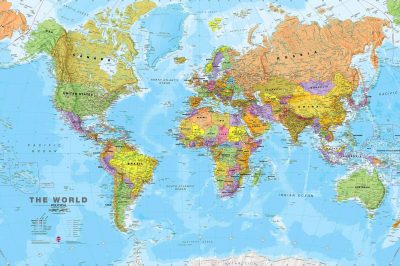Amid mounting economic crunch, domestic political division and waning influence on the Global stage make America a dysfunctional superpower. In the contemporary world, the indispensable nation faces multiple extraneous and Internal threats to its rule-based order.
The post-World War II order was founded by America, in which one center was under assault as multiple power centers emerged across the globe. For instance, China and India lead the pack in Asia with the myriad of smaller nations, which are equally important in the international arena due to their geopolitical location.
Besides Asia, the geopolitical environment in the Middle East had also changed when two long-term enemies brokered a peace deal with each other. The diplomatic ties downgraded between KSA and Iran are now normalized with the help of the new global leader, China.
Regional integration is becoming contentious as the Euphoria of unity is shattered due to geopolitical tensions. First, due to Brexit, the Ideas of refugees and Human Rights were hated by the Britishers. Second was the Russo-Ukraine war, as Germany was unwilling to abandon Russia’s gas and trade ties with China.
Moreover, Western powers are no longer the power centers of the world. London and Paris were the power centers during the age of colonialism and Imperialism. Besides being two global powers, they play an essential role in international decision-making.
However, as Farid Zakaria has written in his book, post-American world Europe is no longer the world’s workshop as the title now belongs to China. So it is not just the decline of America, which is approaching the decline of Western Institutions, and the rise of Eastern world order is impending.
The role of Middle powers in the emerging world order
Erdogan’s Türkiye is eager to rekindle the might of its glory and revive the influence of the Ottoman Empire. As the role of middle powers is expanding, Türkiye which is a member of NATO, first blocked the membership of Sweden and Finland for its strategic imperatives; second, Türkiye brokered the grain deal under the umbrella of the United Nations, third it has close ties with the authoritarian leaders, and lastly, it’s the definition of democracy is different from the Western world.
Its governance model has a close resemblance to Russia. Saudi Arabia, the strategic partner of the USA, declined Biden’s request for an increase in oil production and joined BRICs last year. Similarly, India continued its import from Russia despite economic sanctions. These are all indicators that US influence is diminishing across the globe. The demise of the unipolar moment is evident from these events as multiple centers are emerging.
Also Read: Pakistan-European Union relations deepen at 3rd Indo-Pacific Ministerial Forum
Russo China Axis
The increasingly close relationship between Russia and China has been decades in the making but spurred out in Europe to tighten its embrace. Both countries are strategic partners and participate in joint military exercises as both grapple with the typical Western threat. Both offer non-Western institutions to the world and gain influence on the world stage. China and Russia’s push for better relations began after the collapse of the USSR.
The former was frustrated due to economic sanctions imposed by the West, and the latter was abhorrent to the West due to its disintegration. Both had resolved their border dispute. When Xi assumed power in 2012, Russia was China’s major trading partner and the most significant source of weapons. They founded alternative institutions, SCO and BRICs, which have the potential to replace Western institutions.
Russia’s revisionist aims, including the annexation of Crimea and the War against Ukraine, had widened the schism between European countries and Russia. On the other hand, China’s BRI was the primary concern for the U.S. Although America tried to contain China by Making alliances, including Aukus and Quad, it failed to deter China.
Internal Political Division
Internal political division is another factor contributing to the decline of America. Democrats and Republicans are behaving like two different nations. As one representative of the whites, other representatives of the multiple ethnicity groups. Moreover, democratic backsliding is not just the norm of the globe; democratic values are under attack even in the USA.
The January 6, attack on the US Capitol and increasing polarization in society are the grim indicators. The Swedish think tank report added the US to the list of democratic regressive countries. On the other hand, inflation is the last nail in the coffin as it was rampant due to three-pronged shocks, including COVID-19, Russo-Ukraine, and the Middle Eastern war.
The myriad of external challenges and internal divisions are making America a dysfunctional superpower, and the relative decline of America will escalate due to the above developments, which I’ve explained in my article.
Author Sanan Hassan is an MPhil scholar in International Relations at Punjab University, Pakistan.
** The opinions expressed in this article are solely those of the author and do not reflect the views or position of World Affairs Insider. The organization neither endorses nor takes responsibility for the content of this article and its accuracy.









2 responses
Well written.
Very well explained